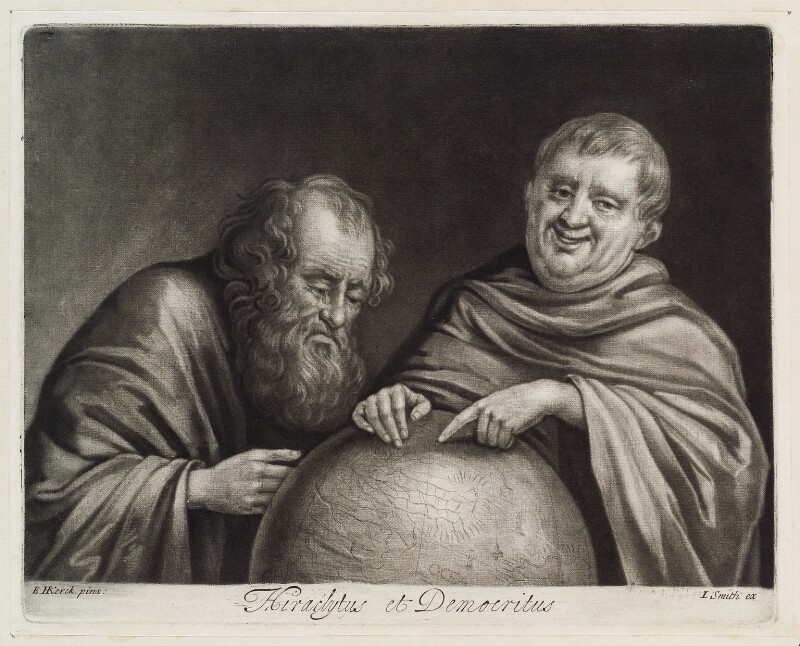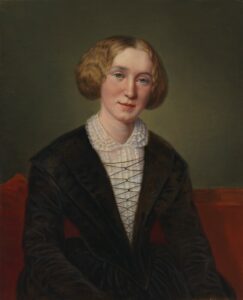

Everywhere man blames nature and fate yet his fate is mostly but the echo of his character and passion, his mistakes and his weaknesses.
The Greek philosopher Democritus, alongside his mentor Leucippus, was one of the first thinkers on record to espouse an atomic theory of the universe – adopting the approach over two thousand years before the atom was observed. His atomic theory was part of his wider argument that the universe could be understood in purely natural terms, without any need of gods, fate or destiny, and devoid of any meaning or purpose beyond what human beings gave it. Most of Democritus’ works have not survived, but the fragments that remain and references to his thought in other writers’ work speak of a man who placed utmost importance on the humanist principles of reason, learning, and the pursuit of happiness – the latter of which earned him the affectionate nickname: ‘the laughing philosopher’.
Nothing exists except atoms and empty space; everything else is opinion.

We don’t know much about Democritus’ personal life but various sources suggest that he was born around 460 BCE in Abdera in Thrace (a region now split between Bulgaria, Greece, and Turkey). His father was said to have been a wealthy businessman whose fortune and trade links permitted Democritus to travel much of the then-known world, allegedly venturing as far as Ethiopia. It was likely upon his return from these travels that Democritus met Leucippus, of whom almost nothing is known; however, it is widely accepted that Democritus was first introduced to atomism by Leucippus, whose thought he would go on to refine and codify.
Democritus advanced a philosophy of nature centred around two fundamental characteristics of the universe: ‘atoms’ (derived from the Greek word atomos, meaning indivisible) and ‘void’. ‘Atoms’ were fundamental particles that existed within the ‘void’, which he conceived of as the complete absence of anything. The atomist approach flew in the face of much of the conventional wisdom of the time. Democritus’ atomism provided a truly different way of understanding the world: one that required no mention of an ultimate end or purpose (telos) to the universe or anything in it, and instead offered a purely natural explanation of the universe. By seeing the natural world as a product of the movement of atoms – which he suggested would act according to mechanical laws – Democritus provided an explanation for motion, change, and causation without any need for appeal to the supernatural or divine. He even attempted to describe a plausible origin of the universe within the atomist framework – one that made no reference to anything more than the arrangements of physical atoms in the void.

Less is known about Democritus’ ethics. For the most part, the fragments that remain are simple sayings and maxims, the suggestions of which are often disparate and do not appear to form a unified or coherent whole. As such, it is hard to chart a direct link between Democritus’ atomism and his ethics. But his nickname of the ‘laughing philosopher’ does seem to be because he endorsed a type of ethical hedonism that placed great importance upon good humour and cheerfulness (euthymia). He also appears to have valued reason and restraint in order to temper the excesses of this hedonism and – like many in the humanist tradition – emphasised human agency and accountability:
Men ask for health in their prayers to the gods: they do not realise that the power to achieve it lies in themselves. Lacking self-control, they perform contrary actions and betray health to their desires.
Democritus is thought to have lived a very long life. Some sources even claim that he was 109 when he died in Athens. A section of The Lives and Opinions of Eminent Philosophers, written by the Greek historian Diogenes Laertius, claims that he lived to a more conservative – but still impressive – 90 years of age.
Democritus’ work established, for one of the first times in Europe, a coherent explanation of the universe without mention of a higher power. His thought is said to have inspired some of those in antiquity most famous for their humanism; in fact, according to Diogenes Laertius, Democritus would go on to teach Protagoras, hailed by many as the first humanist in the Greek tradition. This was a tradition present in Britain at the time of the Roman empire for many centuries. Like many pre-Christian humanistic thinkers, Democritus disappeared from view during the dark ages but his thought re-emerged in the Renaissance and inspired thinkers in Britain such as Francis Bacon and others thinkers of the scientific revolution, who shared the passion of Democritus to search for the fundamental building blocks of the universe – a search which has inspired many humanists, and one that continues to this day.
Democritus | Stanford Encyclopedia of Philosophy
Ancient Atomism | Stanford Encyclopedia of Philosophy
‘The Beginning…’ by Leon M. Lederman | PhysicsCentral
Konstan, D. (2000), Democritus the Physicist. Apeiron: A Journal for Ancient Philosophy and Science, Vol. 33, No. 2. pp. 125-144.
Cole, T. (1967), Democritus and the Sources of Greek Anthropology, Cleveland: Western Reserve University Press.
Hankinson, R.J., 1998, Cause and Explanation in Ancient Greek Thought, Oxford: Oxford University Press.

What do we live for, if it is not to make life less difficult for each other? George Eliot, Middlemarch […]

Faith without works is not Christianity, and unbelief without any effort to help shoulder the consequences for mankind is not […]

I have been the more bold in exposing my opinion because I believe it to be the dictates of truth […]

Kelmscott Manor was the country home of the writer, designer, and socialist William Morris from 1871 until his death in […]